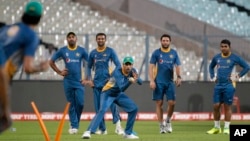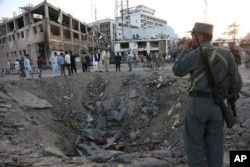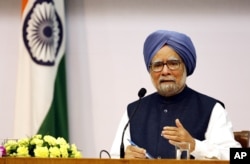Plans for cricket matches between Pakistan and neighbors India and Afghanistan raised hopes that the sport could grease the wheels of diplomacy again.
Instead, Pakistan, facing fresh accusations from its neighbors that it harbors terrorists, finds its isolation intensifying in the fallout from attacks that inflame cross-border suspicions and raise concerns about the safety of athletes and fans alike.
Most International Cricket Council members have refused to play in Pakistan since a terror attack on Sri Lanka’s team in 2009. Pakistan has shifted its international series to the United Arab Emirates, Sri Lanka and England since then. Only Zimbabwe visited last year for a short limited-overs series; Bangladesh refused in March to tour Pakistan for a proposed two-match series scheduled for July.
A deal that was signed with India in 2014 for six series by 2023 fell apart this week amid rising tensions between the rivals.
“Cricket and terrorism can’t go hand-in-hand,” Indian Sports Minister Vijay Goel told reporters Monday.
Afghan Cricket Board President Atif Mashal on Tuesday defended a proposed cricket series with Pakistan in Kabul and Lahore, which had been criticized by Afghans on social media.
“We have to keep politics and sports separate,” Mashal told a news conference.
A day later, after a suicide bombing in Kabul’s heavily guarded Green Zone, Afghanistan pulled out of the matches. Officials there blamed the attack on the Taliban-linked Haqqani extremist group and accused Pakistan's Inter-Services Intelligence agency of complicity.
"In light of the findings of security services and calls by the Afghan nation, the ACB hereby cancel all kinds of cricket matches ...agreement with the Pakistan Cricket Board," Afghan cricket officials said in a statement.
Pakistan denied the allegations, and its cricket board accused the ACB of "playing politics." Pakistan, however, has been isolating itself in the wake of a terror attack that it blamed on terrorists operating from Afghanistan, first closing border crossings between the two countries, then starting work on a border fence.
Past cricket diplomacy
Just as “ping-pong diplomacy” helped thaw U.S.-China relations in the early 1970s, cricket has played a role in easing potential crises in South Asia for almost three decades.
In 1987, with hundreds of thousands of troops massed on both sides of the India-Pakistan border, Pakistan’s then-military ruler, Zia-ul-Haq, boarded a plane and traveled, uninvited, for a test cricket match between Pakistan and India in Jaipur, India. Despite a cool reception from Prime Minister Rajiv Gandhi, reports said Zia whispered something in Gandhi’s ear that started them down the path to detente.
Another Pakistani military dictator, Gen. Pervez Musharraf, also visited India on the pretext of watching a cricket match which resulted in the resumption of stalled dialogue between the countries.
The real breakthrough came in February 1999 when then-Indian Prime Minister Atal Bihari Vajpayee rode a bus to Lahore at the invitation of Pakistani Prime Minister Nawaz Sharif. At a dinner reception, the venue echoed with applause when Vajpayee said, “India and Pakistan are neighbors. We have to live together. We will not let the war happen. Our fields will no longer yield a crop of death.”
The “Lahore Declaration” emerged from this visit in which the parties pledged to avoid confrontation and pursue friendly relations. And Vajpayee cleared the way for the Indian cricket team’s first visit to Pakistan in 19 years with 20,000 special visas issued to Indian cricket fans.
Vajpayee personally met with the cricketers before they left and gave them stern instructions, “Win the matches and win the hearts as well.”
In April 2011, former Indian prime minister Manmohan Singh took the initiative to invite Pakistani Prime Minister Yousaf Raza Gilani to a World Cup match in Chandigarh. The visit paved the way for talks at the home secretary level.
At the 2015 Cricket World Cup, amid an escalation in tensions, Sharif received a phone call from Indian counterpart Narendra Modi the night before the inaugural match between the archrivals.
They discussed cricket, and Modi hinted at resuming stalled foreign secretary-level talks.
While there have been instances of sports being used as a political tool to cause embarrassment, cricket seems to have had a net positive effect in a region where it is so popular. With cricket apparently off the agenda for now, it’s unclear what might provide the impetus for a breakthrough in relations between Pakistan and its neighbors.






